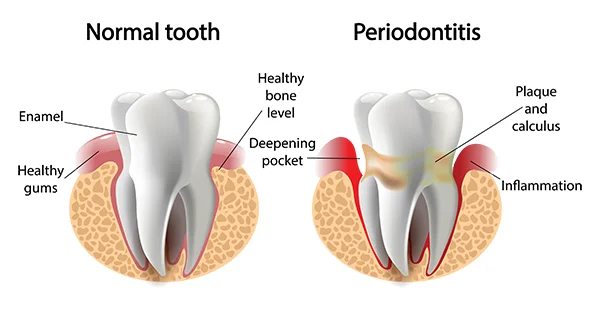Periodontal Care
Quanah • Vernon, TX
Periodontal Care provided by Rolling Plains Dentistry in Quanah, TX
 Gum disease poses a significant threat to oral health, causing damage within the oral cavity by targeting both soft and hard tissues. This includes the gums, teeth, and even the jawbone. Intriguingly, the onset of periodontal disease is initiated by the body itself when patients neglect thorough brushing and flossing, allowing bacteria to proliferate and attack the oral tissues. Gum disease poses a significant threat to oral health, causing damage within the oral cavity by targeting both soft and hard tissues. This includes the gums, teeth, and even the jawbone. Intriguingly, the onset of periodontal disease is initiated by the body itself when patients neglect thorough brushing and flossing, allowing bacteria to proliferate and attack the oral tissues.
For those seeking insights into gum disease and its management, we encourage you to visit our office at Rolling Plains Dentistry. Schedule an evaluation with us today.
What Are the Stages of Gum Disease?
Gum disease progresses through several stages, with the initial phase known as gingivitis. Gingivitis does not affect the surrounding tissue or bone. Symptoms of gum disease may include persistent bad breath, swollen or tender gums, gums that bleed easily during brushing or flossing, receding gums, loose or shifting teeth, and changes in the way teeth fit together when biting. Additionally, experiencing pain while chewing or having sensitive teeth could also indicate gum disease.
It's crucial to understand that once the disease advances beyond this stage, there is no cure available; treatment focuses solely on managing symptoms rather than curing the disease itself. When gum disease progresses into periodontitis, the inflammation extends beyond the gums and affects the supporting structures of the teeth, including the bone and ligaments. This results in the formation of pockets between the teeth and gums, which can become infected and deepen over time.
As the condition worsens, the bone supporting the teeth may deteriorate, leading to tooth loss or the need for surgical intervention to address severe damage. Periodontitis can also increase the risk of systemic health problems such as heart disease and diabetes if left untreated. Early intervention and proper treatment through periodontal care and maintenance, a deep cleaning procedure, is instrumental in slowing down disease progression.
Assessment Procedure for Gum Disease
Through a comprehensive evaluation, we determine whether a patient has developed periodontal disease and we assess its current stage. This assessment allows us to devise a treatment plan tailored to address the condition effectively. During the evaluation, we examine key risk factors impacting disease development. We scrutinize the buildup of tartar and plaque on teeth surfaces, assess pocket size and depth where the gums meet the teeth, and observe gum recession. These are all indicators signifying the presence, and at what advancement, of gum disease. X-rays also help aid in detecting any bone loss, another indicator of periodontal disease.
Non-Surgical Treatment Options
In the early stage of gum disease (gingivitis), non-surgical interventions can both treat and potentially cure the condition. Root scaling involves removing bacteria, tartar, and plaque from tooth surfaces. Root planing smooths tooth roots, preventing bacterial attachment. Antibiotics may also be prescribed. Periodontal care and maintenance, a deep cleaning procedure performed at least three times a year, is crucial to impeding disease progression.
Surgical Treatment Options
Once gum disease progresses beyond gingivitis, non-surgical treatments are no longer sufficient. Surgical options become necessary, including flap surgery to reduce pocket size, gum grafts to restore diseased gum tissue, and bone grafts to address bone loss.
Gum Disease Treatment in Quanah, TX
Patients seeking more information on periodontal disease treatment are encouraged to visit one of our locations near you or contact us by phone at 940-663-5353. Call today to schedule an appointment. |